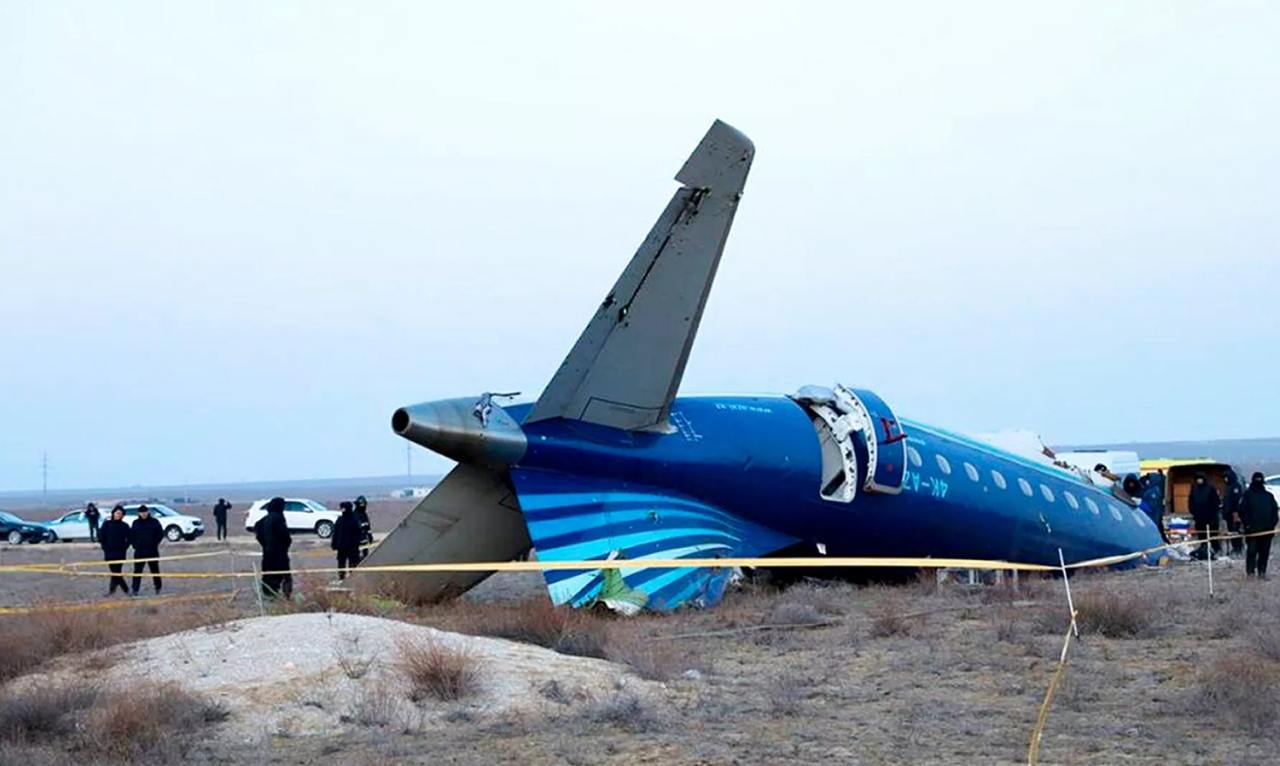


On 31 December, the flight recorders, also known as black boxes, of the ill-fated Embraer 190 jet registration 4K-AZ65, that crashed on December 25, have reached Brasilia. The recorders are of the Cockpit Voice and Flight Data Recorder (CVFDR) type.
Kazakhstan has sent the black boxes from the crashed AZAL aircraft to the Brazilian Center for Investigation and Prevention of Aircraft Accidents (CENIPA), as per the sources of the Kazakh Ministry of Transport.
Additionally, the Brazilian Air Force, through the Center for Investigation and Prevention of Aeronautical Accidents, confirmed that, on Tuesday (31), the flight recorders of the Embraer aircraft that crashed in Kazakhstan, leaving 38 dead, have arrived in Brazil. The expectation is that Cenipa will help to uncover what exactly led to the plane's crash.
The aircraft's recorders will be examined at the Laboratory for Reading and Analysis of Flight Recorder Data (LABDATA) of the Center for Investigation and Prevention of Aeronautical Accidents (Cenipa), in the federal capital.
Cenipa is the Brazilian agency responsible for the investigation of aeronautical accidents and an accredited representative of aircraft produced by Embraer. In addition to the Brazilian technicians involved in the data recording, the Air Force center will receive investigators from Kazakhstan, Azerbaijan and Russia (three from each country).
This decision was made by the Commission investigating the aviation incident, which is chaired by Kazakhstan’s Minister of Transport, Marat Karabayev.
Earlier, the representatives of the CENIPA of Brazil arrived in Kazakhstan to be part of the investigation following the Azerbaijan Airlines’ plane crash near the city of Aktau.
According to the standards set forth in Annex 13 of the Chicago Convention, the nation conducting the investigation is responsible for analyzing the flight recorders and selecting the country for their reading and decoding.
Kazakhstan ratified this convention in 1992 and is a member of the International Civil Aviation Organization (ICAO). In alignment with the provisions of this agreement, ICAO recommendations, and consultations with the aviation authorities of Azerbaijan and Russia, the commission has opted to send the flight recorders to CENIPA in Brazil, the state of manufacturer of the aircraft variant.
This choice is based on Brazil's position as the manufacturer of Embraer aircraft, as well as its technical capabilities, certified laboratories, and the necessary equipment for decoding black boxes, according to the ministry.
The Embraer 190AR plane belonged to the company Azerbaijan Airlines and had 67 people on board, including five crew members. The aircraft was flying from Baku, and the crew made two attempts to land the plane at the Aktau airport, during which chaotic changes in the plane's altitude, veering towards the coastline.
The aircraft ended up deviating from the original route until it crashed on the opposite side of the Caspian Sea. According sources, the plane was hit by Russian anti-aircraft defenses, which were attacking Ukrainian drones.
On the investigation of the crash, according to a note from the FAB,
"at the end of the work, the extracted data will be delivered to the Aeronautical Accident Investigation Authority of Kazakhstan, the agency responsible for the analysis and investigation of the accident in question, in accordance with international protocols for the investigation of aeronautical accidents."
Azerbaijani President Ilham Aliyev has demanded that Russia take full responsibility for the incident, calling early Russian explanations, such as a bird crash or a gas explosion, "absurd" and "an attempt at a cover-up."
On December 27, Azerbaijan handed over three demands to the Russian side in connection with the plane crash: to apologize, to admit guilt, as well as to punish the perpetrators and compensate for the damage to the Azerbaijani state and all victims.
Russian authorities, headed by the Investigative Committee and the Prosecutor General's Office, have set up a working group to determine the exact causes of the accident.
"If external intervention is confirmed, those responsible will be punished," Russian Prosecutor General Igor Krasnov said.
Azerbaijan has requested that the Interstate Aviation Committee (IAC), which is dominated by Russian officials, be excluded from the investigation to ensure impartiality.
The International Air Transport Association (IATA) has called for a comprehensive and impartial investigation into the tragic crash of Azerbaijan Airlines Flight 8243 on December 25, 2024.
The investigation, IATA stated, must adhere to the provisions of Annex 13 of the Chicago Convention, which requires the publication of an interim report within 30 days of an aviation accident.
Amid increasing conflicts globally, the IATA in October reminded the UN Security Council of state obligations to safeguard civil aviation. These include commitments under Article 48 of the Geneva Conventions, which prohibits targeting civilian objects, and the Chicago Convention, which obliges states to protect civil aircraft and passengers.
Meanwhile, Azerbaijani President Ilham Aliyev awarded the title of "National Hero" to Captain Igor Kshnyakin, co-pilot Alexander Kalyaninov and flight attendant Hokuma Aliyeva, and the "1st Degree Order of Bravery" to Zulfugar Asadov and Aydan Rahimli for their courage handling the Baku-Grozny flight of AZAL that has 32 Survivors.
In a posthumous honour, Residents of Baku filled the front of AZAL airplane Captain Igor Kshnyakin’s home with flowers, for remarkable bravery shown by him. Despite his aircraft being uncontrollable, Captain Kshnyakin courageously flew it across the Caspian Sea to Kazakhstan, saving dozens of lives at the cost of his own.
Large number of People attended the funeral of Igor Kshnyakin, Alexander Kalyaninov and Hokuma Aliyeva, the crew members of Azerbaijan Airlines Flight 8432 that crashed near the Kazakh city of Aktau on December 25, 2024 in Baku, Azerbaijan.
In the post crash development, Azerbaijan Airlines restricted the number of flights to Russia. Several more companies, including Israel's El Al and FlyDubai, also announced the suspension of flights to the Russian cities.
You may like to read......
